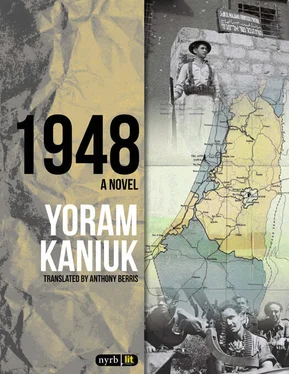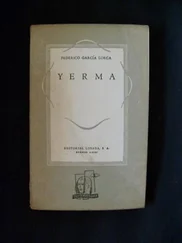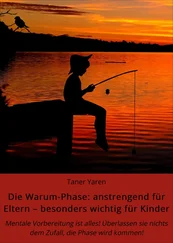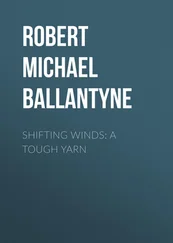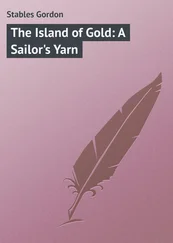A few nights later we were marching through the hills singing “We’re walking like dead men,” which as far as I know wasn’t written by our national poet Chaim Nachman Bialik, and we sang, “When all the girls are bottles / The boys will be the stoppers / We’ll screw and screw and screw” which was not written by Tschernichovsky. And Jerusalem is empty, shells are falling on the Eternal City, its residents hiding in the stone buildings, hungry and thirsty. And booms all the time, and people are being killed in the street and the houses and the schools and in the middle of the songs. After some godforsaken battle that took place and I don’t remember where, I heard that five of the seven boys who’d danced with Benny Marshak and me at the absurd celebration on the hilltop had been killed, and that the two who hadn’t been killed had been transferred to another company. So of the whole gang that had fought together since the battle at Hulda, I was the only one left. I sat on the grass in Kiryat Anavim with my bundle beside me and waited. I wanted water but there wasn’t any. Somebody, who would be killed a day later, came along and asked where the guys were, and I told him that five were dead and two had been transferred to Dado’s company, and he said, Join our armored vehicle, you’re on your own and we’ve got a job for you.
I remember that we had to get Major Even, who was Abba Eban — and perhaps it was even someone else — back to Tel Aviv. And Jerusalem was cut off. Abu Hajar, as Ezer Weizmann was to call him later, who spoke with a soft British accent, looked at us admiringly and it seemed that he trusted us, which I wouldn’t have done in his shoes. After a night of jouncing on a winding drive along back roads and wadis*, behind enemy lines and almost inside them — after being shot at because we couldn’t be clearly identified, and after we fired back here and there not knowing exactly at whom, and we were told that one of us had killed a donkey but apart from me nobody was sorry for the poor Arab beast — we reached Tel Aviv in the early morning. We went into town and the air-raid siren sounded. Egyptian planes were bombing the city and people were scurrying for the shelters. We got down from the armored vehicle by the central bus station, from a distance we saw people wounded and ran to help them, and then more bombs fell and we saw the German aircraft in the sky, flying slowly and making a terrible racket, but we were tired, and there were already a lot of people who had come to treat the wounded, so we stretched while standing and loosened up because we’d been sitting for eight hours, crowded into that fucking armored vehicle, and Abba Eban went into the nearest shelter and more booms were heard and I walked to my parents’ home.
The streets were empty and it was quiet, except for sporadic antiaircraft fire, and I saw old people of my father’s generation wearing black berets with the Civil Guard insignia on them. I heard their whistles and their cries of Kindly switch that light off, even though it was already morning and it wasn’t dark anyway, but the oldsters were confused and tired and carried gas masks slung over their shoulders and shouted, Kindly go down to the shelters, kindly switch that light off, and who says “kindly” today? That ancient verbal beauty had remained in Berlin, which was only renting a place in Tel Aviv at the time.
I looked at the houses that were so deeply planted in the streets I knew and in which I’d grown up. I envied the people unseen in the street, who perhaps I’d dreamed about as if through opaque glass. I thought of my father who, when the Italians bombed Tel Aviv in the big war, would not go down into the shelter because according to the statistics, he explained, the odds against a person being hit in Tel Aviv were five million to one. So he sat in his room on the fourth floor facing the sea and the jackals that wandered by the Muslim cemetery at night, and read Jean-Paul or Heine, until one day he went down into the shelter. Everyone was surprised and asked him, Moshe, what about your statistics? He replied that he’d heard on the BBC that in Moscow there was a zoo in which only one elephant remained, and in an air raid the day before yesterday the elephant had been killed.
Before I reached our apartment at 129 Ben-Yehuda Street, some bombs fell not far away, in Arlosoroff Street, I think. On entering the building I saw the neighbors wrapped in blankets in the lobby that had been turned into a shelter with a wall of white bricks to protect them from shrapnel, and they apparently said hello and apparently were surprised to see me because they knew I was away. I nodded, I didn’t have the words, and I climbed the stairs and went into the apartment. My mother ran after me. She later told me that I’d come in and didn’t say hello and didn’t say a word and hurried into my sister, Mira’s, room, who was seven at the time, and I slammed the door behind me and didn’t come out for a long time. I didn’t eat. I didn’t drink. For hours and hours I drew with colored crayons I found in my desk drawer. I apparently moved the desk and stood on it to draw on the ceiling. I drew monstrous drawings: I drew a vulture, I drew an eagle with a human eye in its beak, I drew Holocaust survivors who were already to be seen on the streets, I drew roofs, especially one from which I apparently thought I wanted to jump. I didn’t let anybody in. After the war, when I saw the drawings again, I cleaned them off with detergent.
As I drew I remember the smell of burned sausage coming from the kitchen, which wafted through the window above my sister’s bed. I dragged myself to the kitchen and wolfed down the sausage, and I dimly remember the kerosene stove and the Primus on which a pot of goulash stood waiting for me in vain. I heard my mother’s weeping and somehow I remember, as if in a dream, going out onto the balcony and staring at my sea, which was more of a home to me than any other home I ever lived in, and whose deep blue beauty on winter evenings was my secret life, and I heard the sad howling of the jackals near the Muslim cemetery, and I remember the music of the gutters in the rain that hit me, and the sun slicing the sea, and all of this apparently imbued me with a kind of confidence.
My father and mother, so they told me later, understood and didn’t ask. They didn’t even know that I’d come from Jerusalem. After a night and half a day I went out of the house and walked to the central bus station, which was almost destroyed. I ran part of the way. The armored vehicle was waiting there with some guys who’d come and seemed to be asleep on their feet. A plane passed overhead. A fat man gave me a Simon Arzt Egyptian cigarette with a gold mouthpiece of the kind not seen in Palestine. I stood with them. We didn’t say hello. I don’t remember the start of the journey, only that the day was at its height and the light full, big, and when we reached Bab el-Wad we were identified and a massive fusillade began. We fired back through the slits we slid open, and when I moved back to change the magazine a round came through the open slit and ricocheted from side to side. It sounded like a steel bee, its banging on the metal sides feeble. We had nowhere to hide. We saw passing darts of flame and we were imprisoned and the bullet flew and flew and flew, and in the air hung a smell more of wonderment than of fear because we hadn’t been prepared for such a situation. The bullet could only be detected by the tracers of dim light it left in its wake, and two of our number fell onto our legs. They moved slightly, yelled, and suddenly fell silent and their blood flowed onto our feet. The bullet continued to fly until its force was spent. When it fell, Mishka grabbed it and threw it out as if he wanted to exact vengeance. The bodies at our feet, saliva drooling from their mouths, we continued on our way.
Читать дальше
